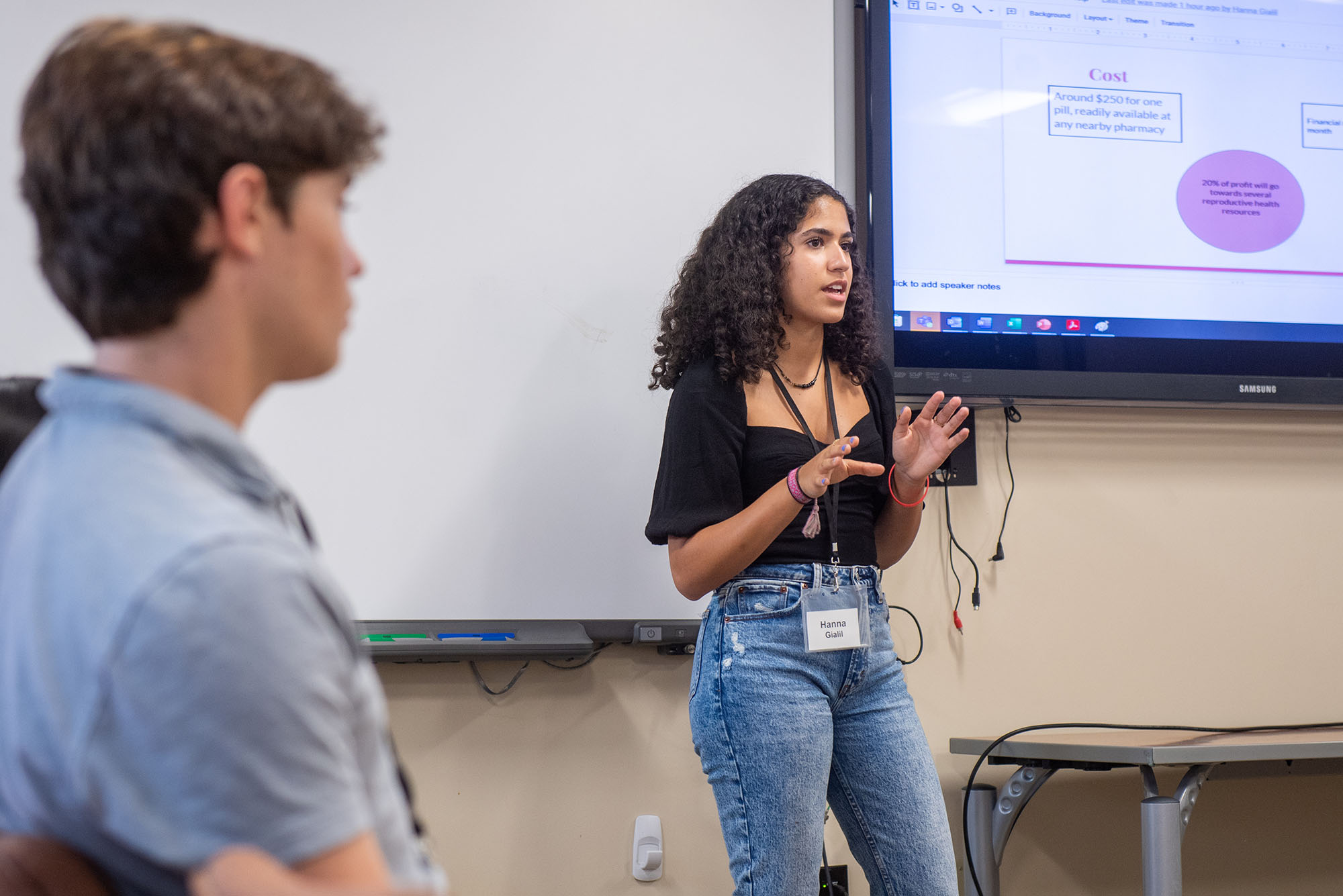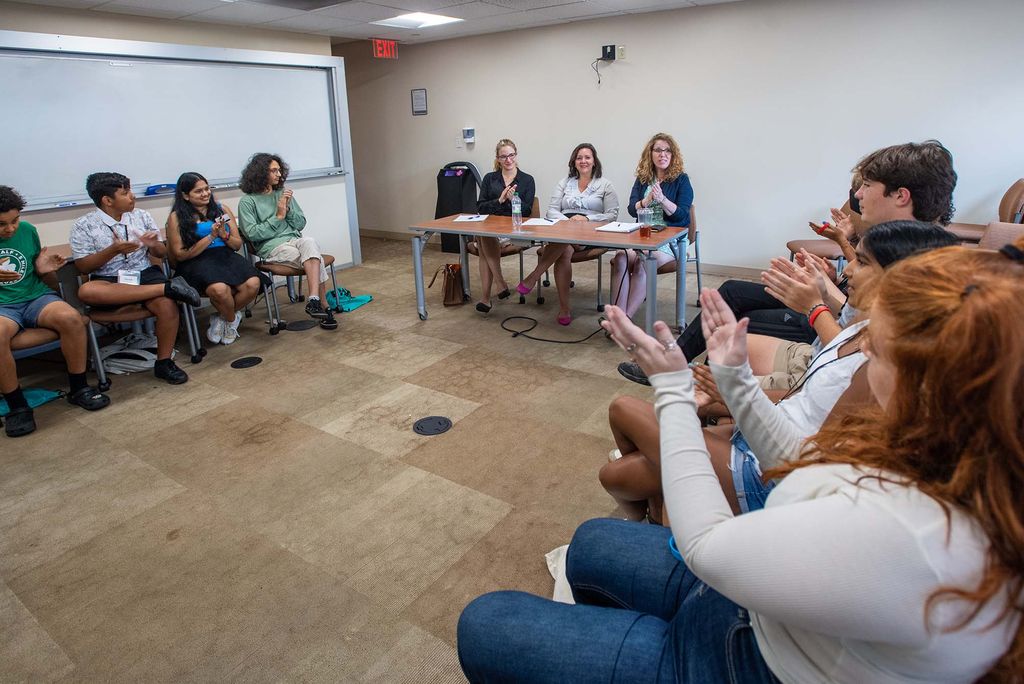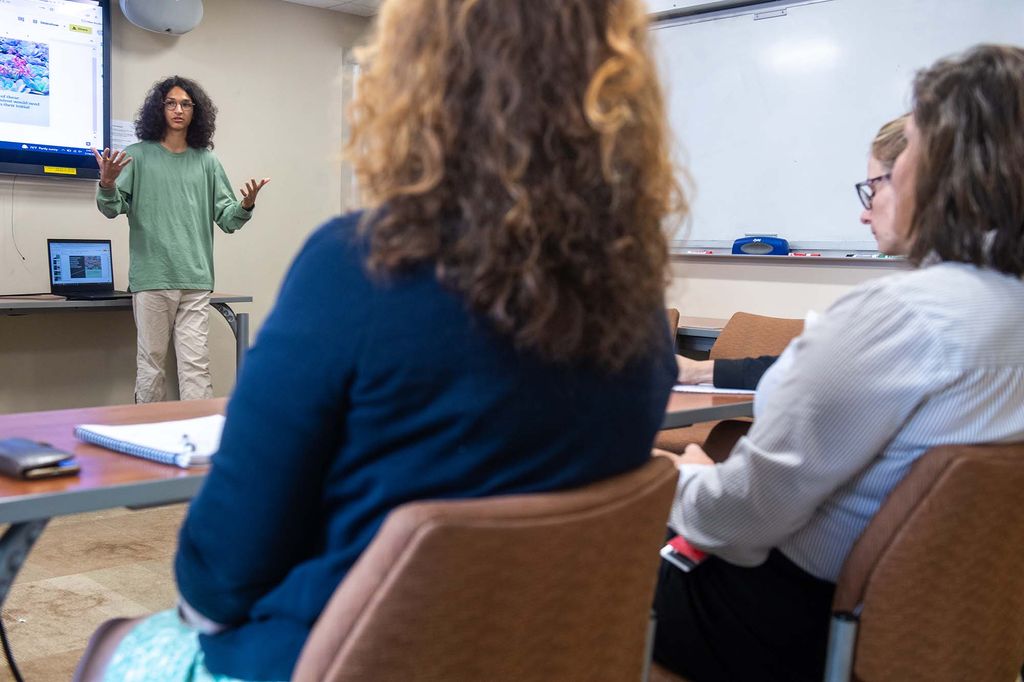This BU Summer Program Gives High Schoolers Real-World Public Health Experience

Boston high schooler Hanna Gialil was among the students presenting at a Shark Tank–style pitch competition as part of SPH’s PopHealthExperience summer program.
This BU Summer Program Gives High Schoolers Real-World Public Health Experience
The School of Public Health PopHealthExperience program provides hands-on learning
Since 2020, public health has been in a continual spotlight thanks to the COVID-19 pandemic, making household names of people like Anthony Fauci (Hon.’18) and Deborah Birx and giving us buzzwords like “viral load” and “Deltacron,” now tossed around as casually as the latest internet slang.
Here at Boston University, the heightened attention to the field presented an ideal opportunity for the School of Public Health to revive its PopHealthExperience (PHE), a two-week summer program for local high schoolers run by SPH’s Lifelong Learning Office and designed to generate interest in the public health field. A condensed, virtual version of the program was held last year, where participants learned how to code and graph health-related data.
This year’s program, running July 11 to 22, offers rising 10th, 11th, and 12th graders the chance to explore the field with hands-on learning experiences. The curriculum includes a lecture on biostatistics, workshops on public health policy and advocacy, a Shark Tank–style pitch competition, and tours of the Massachusetts State House and BU’s BUild Lab, among other lessons and activities, all led by faculty and staff from SPH and various University departments. At the end of the program, teams of participants create video presentations on a public health issue of their choosing.

The curriculum was developed with help from SPH faculty members Lisa Sullivan (GRS’86,’92), a professor of biostatistics and associate dean of education, Megan Healey, a professor of epidemiology and director of Master of Public Health programs, and Patricia Janulewicz Lloyd (SPH’06,’08), an associate professor of environmental health.
The goal was to give high schoolers snapshots of everything the public health field entails, says Francisco J. Patiño (SPH’20), assistant director of Lifelong Learning and PHE program manager.
“Essentially, what I want to show them is that there is not one path to public health,” Patiño explains. “You could be a nurse, lawyer, policymaker, a healthcare administrator at a hospital—there are so many things you can do that affect public health. I’m hoping to show them the wealth of paths so that if they’re interested in one of them, they know that [a career is possible].”
Participant Hanna Gialil, a sophomore at Boston’s Commonwealth School, has long had an interest in the medical field. PHE is a natural extension of both her interests and her hope to eventually attend BU, she says.
“I feel like public health gives you insight into all the things that make the medical field what it actually is,” Gialil says. “When people think about medicine and health, they think of hospitals and doctors. But here, I’ve learned so much from guest speakers about things like biostatistics and other specialties that I never would have thought fit into the medical field.” The program has reinforced her desire to work in the health field, she says.
Sam Lehrich, a senior at Dover-Sherborn High School, signed up for the program to learn more about real-world applications of statistics and data analysis. “I wasn’t sure how you gain access to data to analyze and do stuff with,” he says. “This program has a lot of biostatistics ingrained in it at its base and it’s been interesting to learn about both public health and [how you use] public health data.”

He also values learning from faculty about the public health angle involved in current issues. As someone who doesn’t always closely read the news, Lehrich says, it’s been intriguing to see just how much political decisions surrounding gun control, the environment, and abortion access impact work done at SPH and on the BU Medical Campus.
The PopHealthExperience program is just one of the Lifelong Learning Office initiatives. (The office’s stated mission is “to advance public health understanding and skills among individuals, organizations, and communities” at every age.) Other offerings include webinars on the science behind public health, free “mini-Master’s” modules for medical professionals and civilians alike, the popular Free Associations podcast dissecting articles from medical journals, and the forthcoming “Health in Focus” film festival, scheduled for December.
To Patiño, the teen summer program feels especially pertinent at this moment in history. “Given everything that’s going on right now, I think it’s more important than ever to have younger audiences engage in public health, because we are setting the foundation for the world they are inheriting,” he says. “The fact that they’re learning about this at a younger age means that when they get to a position to make decisions, they’ll be more versed in everything than some of us were.”
And based on his observations as program leader: “I feel good about the decisions that the next generation will make,” he says.


Comments & Discussion
Boston University moderates comments to facilitate an informed, substantive, civil conversation. Abusive, profane, self-promotional, misleading, incoherent or off-topic comments will be rejected. Moderators are staffed during regular business hours (EST) and can only accept comments written in English. Statistics or facts must include a citation or a link to the citation.